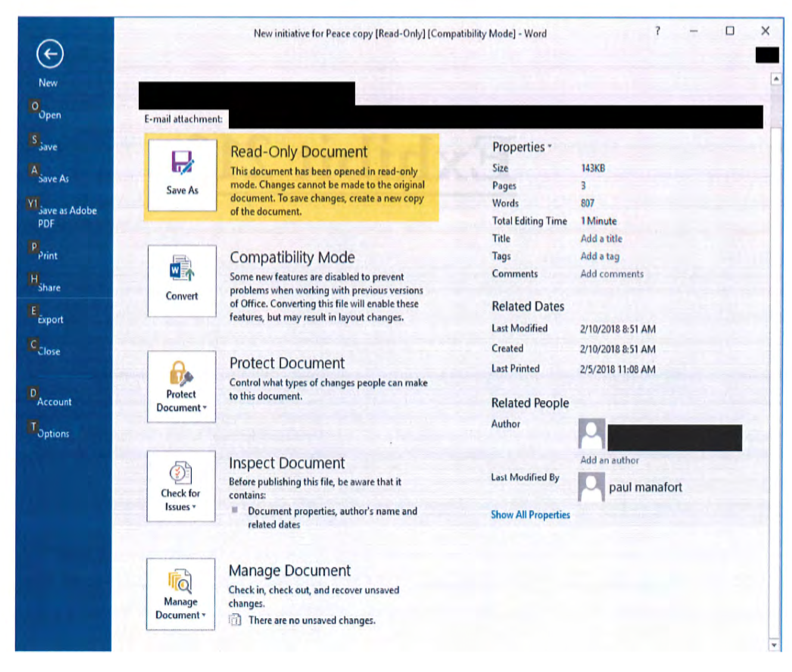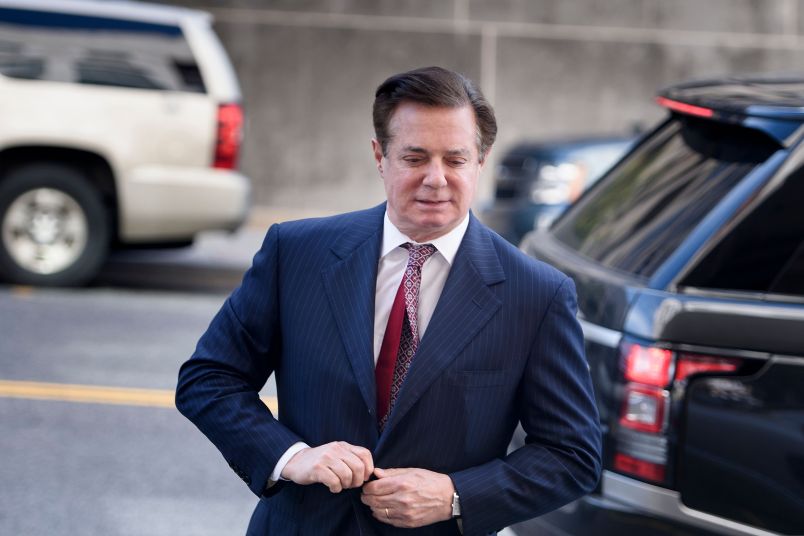Special Counsel Robert Mueller released a detailed — but redacted — filing on Tuesday outlining why he believes Paul Manafort violated his plea agreement with prosecutors.
With its heavy redactions, the filing at times reads like an extremely bland game of madlibs, with references to Manafort admitting certain things while the substance of what he allegedly admitted to falling under redaction.
However, the unredacted sections shed at least a little bit of new light on what Manafort was being asked to testify about over two sessions with a grand jury.
The filing includes a declaration from Jeffrey Weiland, an FBI agent working on the case.
The declaration lays out the background of Manafort’s purportedly brief period of cooperation with the government, including an episode after his guilty plea to witness tampering in which he denied that his Russian associate, Konstantin Kilimnik, attempted to tamper with witness testimony.
For instance, it appears that during a grand jury session on October 26, 2018, Manafort was asked to discuss his interactions with Kilimnik, who has been tied by Mueller to the Russian intel agency that hacked Democrats in 2016.
Mueller appears over the past few weeks to be ratcheting up his focus on Kilimnik, who met with Manafort multiple times between 2016 and 2017.
The filing also says that Manafort lied to prosecutors about his contacts with the Trump Administration in front of the grand jury. The political consultant supposedly told prosecutors that he had no contact “with any member of the Administration and did not try to have such contact.” The filing goes on to say that “evidence demonstrates that Manafort’s statements were false.”
Regarding Manafort’s alleged lies about contacts with the Trump administration, Mueller’s team offered a text exchange in which an unnamed individual claiming to have an impending meeting with President Trump writes to Manafort, “If I see POTUS one on one next week am I ok to remind him of our relationship?”
Manafort replies to the message, dated May 2018: “Yes. Even if not one on one.”

The document, through heavy redactions, also refers to another, unspecified “DOJ Investigation.” In that case, Manafort is said to have given “different versions of events surrounding an incident in [REDACTED].” Prosecutors say that Manafort told them a “more incriminating” version of events before his guilty plea, and then changed the story to a “more benign” telling after the plea.
Another exhibit appears to link back to allegations that Kilimnik was peddling a settlement plan for the Ukraine crisis that could have seen his former client – the country’s ex President Viktor Yanukovych – return in a bid to broker a peace agreement. The exhibit shows the information page for a document titled “New initiative for Peace,” dated February 2018.

A final footnote on the FBI agent’s declaration says that while Manafort provided electronic devices and digital media to prosecutors, he fell short in one crucial way: prosecutors write that Manafort “did not provide passwords” in more than ten instances.
Read the filing below:







I know I may be asking quite a bit here but is it really reporting to just post the filing with no analysis or summary of what it contains? Or is the point to simply be first out with it? Will this ‘article’ be updated once an analysis is completed? How about some insight into the massive redactions?
Asking for a friend (who is questioning the Prime model…)
ETA: Okay, I see the article is being fleshed out as Tierney and Josh read thru it. Apologies all 'round.
How soon before Jeffrey Weiland joins the panoply of “crooked” FBI agents attacked in the Trumpsters’ tweets? Do we make it past midnight?
The filing is 31 pages long. I’m not expecting and wouldn’t give much weight to insta-analysis, and am happy to skim it myself right now.
It might not be reporting as we traditionally think of it but it’s information a number of members here would pounce on and start reading for themselves. If they don’t want to wait, why make them, I imagine is the reasoning. I see it as one of a variety of services and thoughtful opportunities I get.
My my, things heat up on page 12.